How samovar tea is warming hearts in Qatar
Fresh, milky samovar tea is giving its more established brother, the evaporated-milk karak, a run for its money.
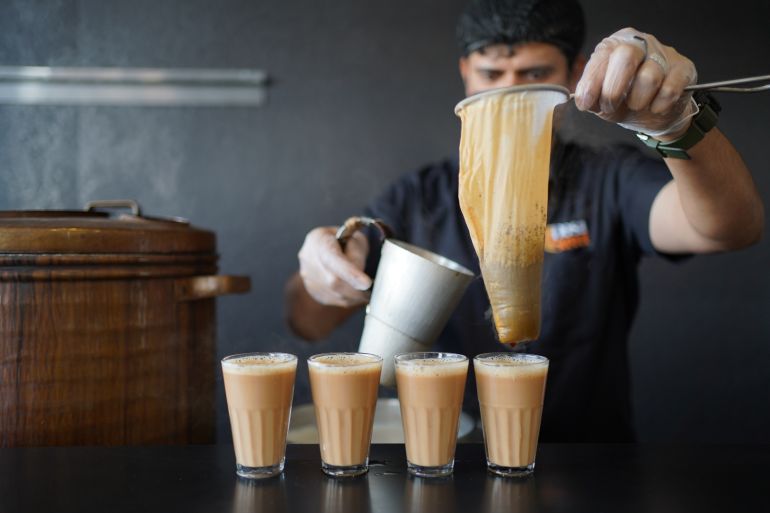
Doha, Qatar – Mohammed Ali, a restaurateur in Qatar’s capital Doha, tells a story about a female customer who would come to his shop every day with a flask to have it filled with karak tea.
One day, her driver brought the flask and said the woman was in a hospital ready to give birth. But she needed her karak.
Keep reading
list of 3 items‘Adrenaline rush’: How street cricket has evolved in Qatar
Photos: Pearl diving tradition being kept alive in Qatar
The next day, she herself showed up with her flask.
Ali’s restaurant is not an upmarket cafe, it’s a nondescript 65-year-old eatery on Doha’s Old Airport Road, so what inspires this loyalty? It’s the karak.
Karak is a sweet, milky tea made by boiling water, thick canned milk, tea leaves, sugar and cardamom (some places add saffron) together until it reaches just the right consistency, which varies according to the karak maker.
Everyone in Qatar knows what it is, and the country’s kaftheeriyas (cafes) serve thousands of cups of it daily, most costing just 1 riyal ($0.27).
Before the era of Instagram and social media influencers, finding a winning karak recipe, and having a good location, was the key to pulling in customers.
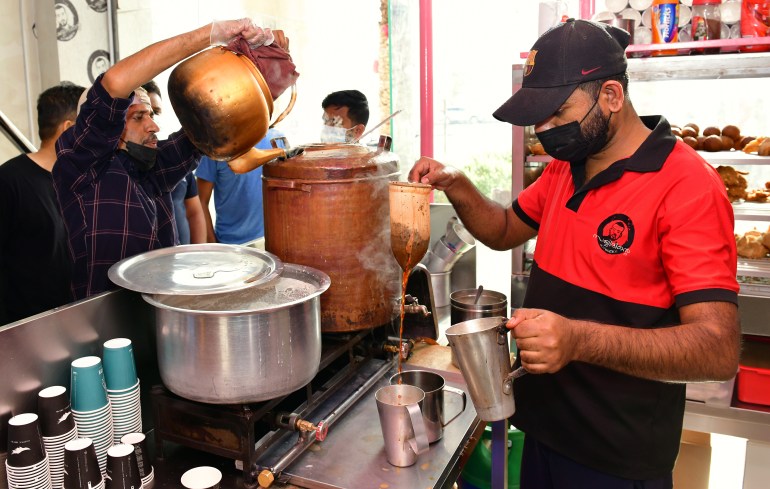
“The kaftheeriyas experimented with different blends of spices, milk and tea leaves to create flavours,” Ali said.
Walking into the shop is optional. You can honk your car’s horn and someone will be at your vehicle within seconds, ready to take your order.
Karak and samovar tea come to Qatar
How and when karak arrived in Qatar is still disputed, but the general consensus is that South Asian expats brought the milky tea with them as long ago as the 1950s.
Today, a lot of Qatar’s karak is made by people from the Moplah Muslim community of India’s North Malabar region, who were a land-owning, agrarian community.
“When agriculture went bust, youngsters from feudal families found the Gulf region as a haven where they could cash in doing any type of work away from home,” Rafeeq Thiruvalloor, a Malayalam writer from North Malabar, told Al Jazeera.
The same Malabaris brought samovar tea to Qatar.
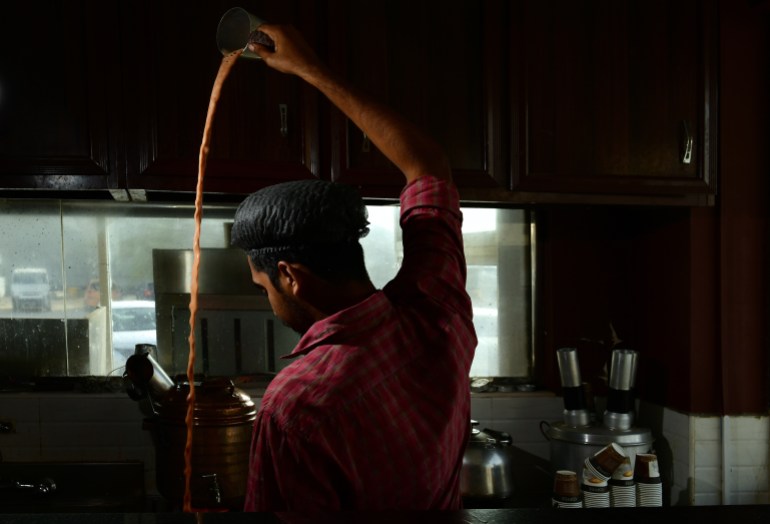
Samovar tea, the more recent arrival which is gaining popularity now, and karak look the same but there are some major differences.
A karak, by default, is a strong tea, even the name sounds strong. Samovar tea is not strong by default, you have to request that, and it uses fresh milk whereas karak relies on thicker, canned milk.
With a standard karak, you don’t get many options when it comes to sugar levels. Many find karak oversweet and have to specify if they want a milder option.
In contrast, if you want your samovar tea sugary, you have to specify that in your order. Most samovar shops let you pick how you want your tea: strong, medium, light, waterless, well-beaten or unbeaten.
Before samovar, some karak tea shops served “fresh-milk tea” upon request – at double the price. There was also a “Sri Lankan tea”, simply a beaten version of karak.
Sajeer bin Abbas, a software engineer, said he stopped having tea at shops in Oman, where he worked for seven years, because the teabag-infused karak served there disgusted him.
“Now, samovar tea is one of the pleasures of working in Qatar,” he said.
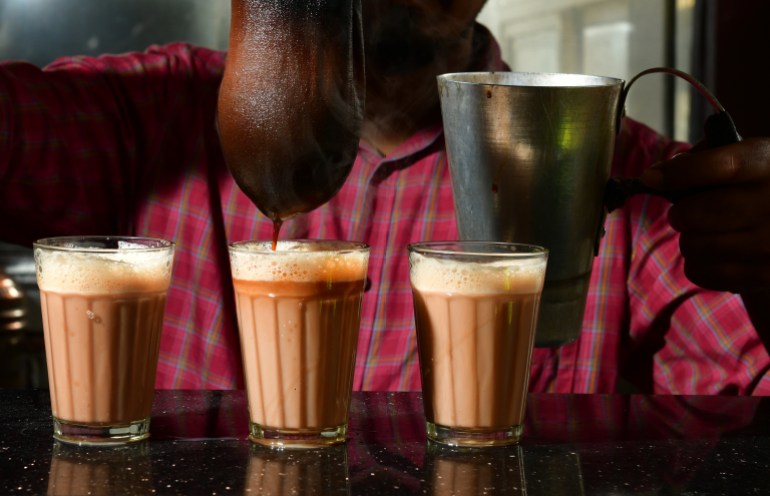
No one remembers seeing a samovar tea shop in Qatar before 2014. Now, while the number is still shy of 100, you often see long lines forming outside.
By most accounts, Lordz Restaurant, tucked away in Al-Thumama’s Furjan Market 36, is Qatar’s first samovar tea shop. The shop is known as Sayyidinte Chayakada (Sayyid’s teashop) and its owner, 39-year-old Sayid Komban Chalil, said he launched the business in 2014.
He came to Qatar 20 years ago and worked at his father’s cafeteria in the southern city of Al-Wakra. Eight years ago, he brought a samovar, from Kozhikode’s Copper Bazaar in the Indian state of Kerala.
Until recently, Chalil says, his stencilled image with a “Sayyidinte Chayakada” logo was on the glass door but authorities asked him to remove it. The name exists on the shop’s website, on one of the inside walls and on the jerseys of three cricket clubs he sponsors.
Chalil, who comes to the shop now only in the evenings, said he was very active when he was setting up but owning a stable business helped him slow down.
On weekends, street cricketers flood his shop. He used to play for the Thumama Boys club and a shelf laden with trophies adorns one of the walls in the shop.
Until a recent repaint, Sayyidinte Chayakada was decorated with old Indian movie posters, giving it the look of old teashops in Malabar towns.
Samovar shops love their nostalgia. In Fereej Bin Mahmoud’s Chaya Kada, there are bicycles on the wall, old radios on display and a three-wheeled tuk-tuk rickshaw. New Plaza has a mural on the wall of a teashop in Kerala. In Asian Town’s Metro Restaurant, black and white photographs of a colonial Indian fort town adorn the wall.
Those suffering from homesickness can get a quick fix.
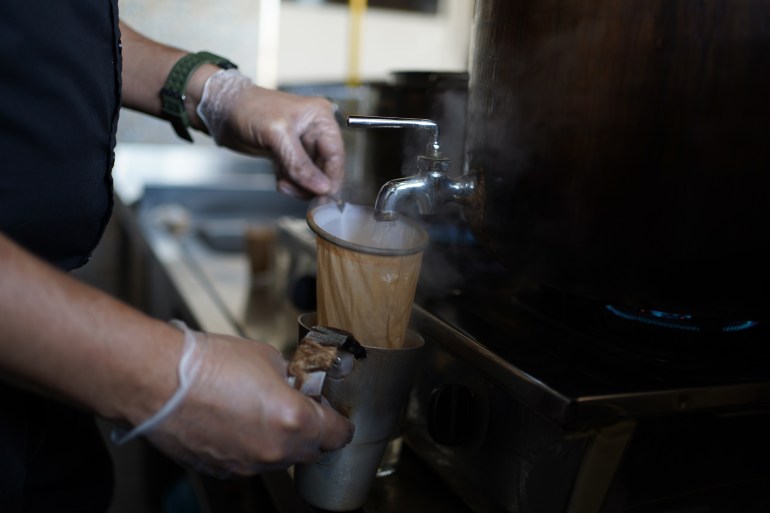
The samovar
Chalil’s samovar is a barrel-shaped copper utensil that keeps 40 litres (10.5 gallons) of water boiling on a gas stove below a faucet. This is what is used to make the “decoction”, a potent sugarless black tea, and to keep milk simmering in an upper chamber.
Water is added through a hole on the top and milk heats up separately. The tea goes in the boiling water contained in a small fabric pouch, to keep the leaves from floating around in the finished tea.
If you want a cup of sugarless black tea, all it takes is about two tablespoons – 30ml (1 ounce) – of decoction added to 90-120ml (3-4 ounces) of boiling water.
Most samovar tea patrons, however, prefer milk tea. So the tea maker will add a ladle of simmering milk from a nearby stove and a spoon of sugar then he will “beat” the tea.
“The milk boiling on … top is a reserve. The tea-maker can’t always raise his hand to take it from there,” explained a tea-maker.
To beat the tea, the tea-maker pours it back and forth between a mug and a cup, raising and lowering his hand in a rapid, up-and-down movement to create froth. The consistency, foaminess and taste reach a new level with the beating, nearly impossible to replicate at home.
People watch the tea-beating pretty carefully. If the tea maker gets his hands really far apart, people call it “metre tea”, referring to the distance between the hands.
Beyond beating, the ratio of the ingredients, the heat dynamics of the stove,t the flavour of the decoction and milk, contribute to whether or not a tea maker is called a tea ustad (tea master).
Drinking tea at Lodz was Harshad Kuttipran, a samovar fan who likes exploring new places for tea and hopes to have a shop of his own.
His late father had teashops in India’s Andhra Pradesh and Karnataka states. Growing up in Kerala, he remembered that teashops as institutions for socialising, where patrons could read newspapers and listen to the radio. “The news would lead to heated political debates,” Kuttipran said.
Can samovar challenge karak?
While people like Chalil are optimistic about the prospects of samovar tea in Qatar, many reckon karak tea will remain on top.
In Madinat Khalifa’s Kismath, a restaurant that serves samovar, tea-maker Salman has no time to talk. The one thing he said is that he makes 700 cups of tea during his shift.
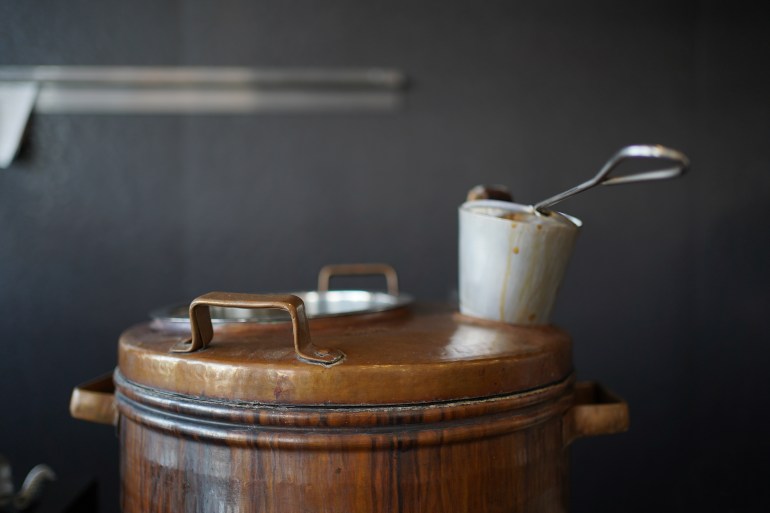
But karak has a steady and established fan base, Muhammed Shibli, general manager at Tea Time, a chain with more than 50 branches across Qatar, said.
“People have more than 10 cups a day. We will remain serving karaks and only karaks for the time being,” Shibli said.
A partner in the Zanjabeel karak chain said his branches would serve only karak. However, Dosa Street, his south Indian cuisine venture in the Ain Khaled area of Doha, serves samovar tea.
Personally, he prefers karak because he finds the samovar tea makers’ habit of putting another layer of decoction over the foam sometimes leaves a sour taste.
In neighbourhoods like Matar Qadeem (Old Airport), where the population is younger and where gyms and barbershops are open round the clock, samovar tea shops provide a sense of community, or “vibes”, as the residents put it.
Many branches of House of Tea, another chain, have recently drifted towards samovar tea, said Kuttipran, the tea fan.
“Still, I don’t think Qataris and other Arabs will like the samovar, which is also generally less sugary than karaks.”
